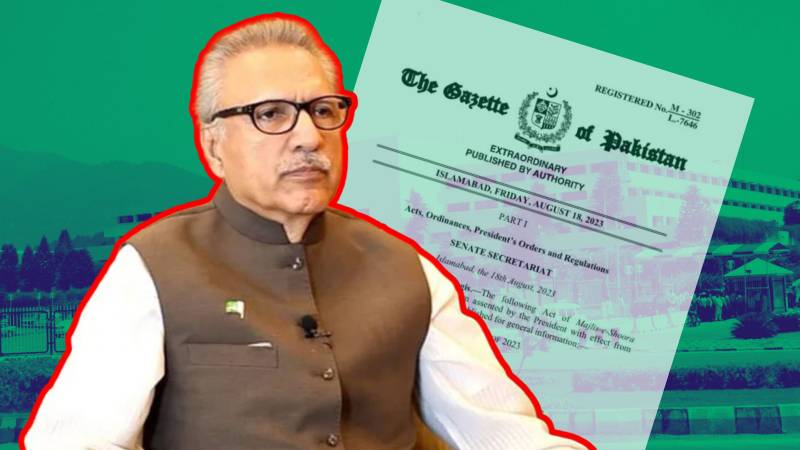
President Arif Alvi on Sunday caused a stir after he posted a message on social media in which he denied having signed two contentious bills, the Official Secrets (Amendment) Act and the Pakistan Army (Amendment) Act, into law. However, the confusion was soon dispelled by constitutional experts and a notification from the establishment division, which deemed that the two bills had now become law.
On Sunday afternoon, President Alvi posted a message on social media site X (previously called Twitter), creating confusion in the country about whether there were two new laws and the status of the two bills. Previously, the President's office would issue a press note/press release on issues carrying his statements, directives or opinions on the consent or refusal of any bill. However, this is the first time that the President opted to communicate about bills via social media.
In his tweet, the President remarked, "As God is my witness, I did not sign the Official Secrets Amendment Bill 2023 & Pakistan Army Amendment Bill 2023 as I disagreed with these laws. I asked my staff to return the bills unsigned within the stipulated time to make them ineffective."
https://twitter.com/ArifAlvi/status/1693182548644647341
Within minutes of the tweet, the matter became an issue of national importance, initiating a debate on how these 'acts of parliament' would be considered now.
Constitutional experts and those from the legal profession believed that there was no confusion on the fate of the two bills and that both should be considered 'acts of parliament'.
Legal and constitutional expert and twice former attorney general of Pakistan Ashtar Ausaf explained that even if the President did not sign the bill, it would have become law eventually.
"What if the President was not available to grant his consent? The bill, after ten days, becomes an act of parliament in case of his refusal or consent," he told The Friday Times, adding that there was no other option to consider.
When contacted, legal and constitutional experts and former Secretary of the Election Commission of Pakistan (ECP) Kanwar Dilshad believed that both the bills will be considered an 'act of parliament' irrespective of what the President does.
"It automatically becomes an act of parliament," he said, explaining what happens if the President refuses to sign a bill.
He added that anyone who objects to this can take up the matter before the Supreme Court(SC).
According to Article 75 of the Constitution, a bill that has cleared both houses of parliament and is sent to the President for approval but is returned unsigned with observations or objections automatically becomes law within ten days.
"When the President has returned a Bill to the Majlis-e Shoora (Parliament), it shall be reconsidered by the Majlis-e-Shoora (Parliament) in joint sitting and, if it is again passed, with or without amendment, by the Majlis-e-Shoora (Parliament), by the votes of the majority of the members of both Houses present and voting, it shall be deemed for the purposes of the Constitution to have been passed by both Houses and shall be presented to the President, and the President shall give his assent within ten days, failing which such assent shall be deemed to have been given."
Meanwhile, the bills were published as laws in the Gazette of Pakistan and were dated August 18, 2023.
Did Alvi return the bills?
Three days before this controversy, the President's office had formally conveyed that the President had refused to sign 13 bills and had returned them to the Parliament for reconsideration.
Both houses of parliament had passed the returned bills by the Pakistan Muslim League-Nawaz (PML-N)-led coalition government before it went home after the premature termination of the assembly.
While President Alvi had approved several bills passed by the lower and upper houses of parliament in recent weeks, he returned to the parliament various bills, including the Code of Criminal Procedure amendment bill, a piece of legislation that gave additional powers to police.
Other returned bills include Press, Newspapers, News Agencies and Books Registration amendment bill, seeking to replace the word 'federal government' wherever occurring in the law with 'Prime Minister'; the Protection of Journalists and Media Professionals bill, seeking to transfer implementation of protection of journalists from Ministry of Human Rights to the Ministry of Information; and the National Commission for Human Development (Amend¬ment) Bill to redefine the functions of NCHD and others.

